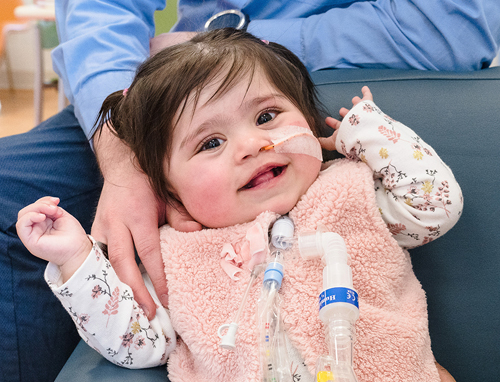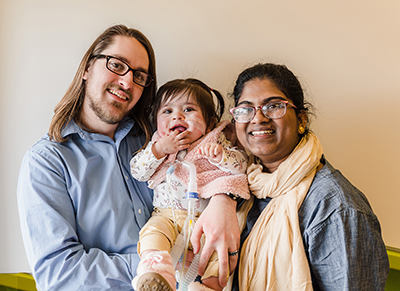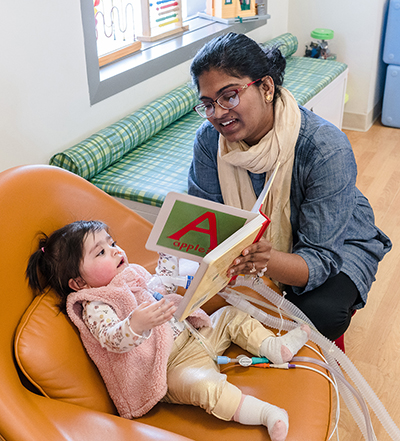Eliyah Perry
Infant with Multiple Congenital Defects Rallies to Beat the Odds
 “Eliyah’s on her way, Eliyah’s on her way
“Eliyah’s on her way, Eliyah’s on her way
On her way to her family’s farm
We will miss her, we will miss her
Her smile and her sweet charm”
A group of hospital staff gathered at the exit of the Golisano Children’s Hospital (GCH) lobby, singing and clapping to the small baby, who sat wide-eyed in her stroller.
Rocking sparkly gold pants, the baby wore a shirt with the word “strong” scrawled across it. Tubes were connected to the infant’s body, keeping her alive.
“Look at her,” said a staff member excitedly, as the baby kicked her little feet to the gentle strums of the guitar.
The baby’s mother grabbed her husband’s forearm, trying to hold back her tears. She did not break down until a staff member handed her a congratulations card.
After four months at GCH, parents Kurtis Perry and Jeshurun Periannan were finally headed home with their daughter, Eliyah. They had only recently furnished her nursery.
“We were so scared,” said Jeshurun. “We didn’t want to make something and have to come home to an empty room.”
Diagnosis After Diagnosis
Jeshurun and Kurtis had been through ultrasounds before. With two healthy girls, they expected another routine pregnancy.
But doctors saw issues in Jeshurun’s first ultrasound. 12 weeks into her pregnancy, they could see Eliyah had a cystic hygroma — a fluid-filled sac caused by a blockage in the lymphatic system — on the back of her head. The sac was almost the same size as her head.
In addition, doctors discovered a rare defect — organs protruded through a hole in Eliyah’s abdomen, leaving those organs outside the body covered only by a thin membrane (an omphalocele).
By 20 weeks, doctors at the Strong Perinatal Associates in Red Creek had found another defect. Eliyah had a severe congenital heart disease, called Tetralogy of Fallot (ToF). ToF is a combination of four related heart defects that limit the amount of blood that can be pumped from the heart to the lungs, resulting in low oxygen levels.
Nineteen weeks later, Eliyah was born on May 13, 2019 at GCH in a room full of medical professionals ready to give her care.
Like any expectant mother, Jeshurun wanted to be with her daughter after birth. But she had to wait almost 24 hours because the Neonatal Intensive Care Unit (NICU) team immediately whisked Eliyah away to begin treatment.
“When we called to see if I could see her that evening, they said that she was so bruised up, and from everything I had to do, it would have been too much for me traumatically to see her,” said Jeshurun.
‘Outside Our Normal’

Eliyah with parents Kurtis Perry and Jeshurun Periannan
Eliyah first received care at the NICU. Luckily, her omphalocele was smaller than doctors had expected it to be. The cystic hygroma had disappeared.
But her heart defect was significant. Eliyah’s omphalocele prevented her from breathing on her own. To help keep Eliyah stable, doctors used a breathing tube connected to a ventilator. A smaller tube fed her through her nose.
Doctors wanted to fix her heart defect, but Eliyah’s omphalocele was in the way.
“She would have had cardiac surgery if not for the omphalocele,” said Jill Cholette, M.D., Chief, Pediatric Intensive Care. “We had to go sort of outside our normal.”
They planned to postpone Eliyah’s heart surgery until they had the physical space to open her up — Eliyah needed to get bigger, and her omphalocele needed to get smaller.
To manage her omphalocele, the NICU team used a burn cream that had silver in it. The cream promoted skin to grow over the omphalocele by keeping it in a moist environment. Dressings were used to wrap the omphalocele. As Eliyah’s parents put it, “Frost it like a cupcake, wrap it like a wonton.”
The NICU team also monitored Eliyah’s respiratory status around the clock, making sure her oxygen levels were adequate. The cardiac team administered a medication that kept a blood vessel open so Eliyah could get blood to her lungs to be oxygenated.
But as the weeks went by, NICU nurse Carol Schreiber noticed Eliyah’s oxygen saturations were dipping even with extra support from the ventilator.
And then Eliyah’s parents got a call. Eliyah was being moved to the Pediatric Cardiac Care Center.
Susan Martin, M.D., a pediatric cardiac intensivist, remembered admitting Eliyah from the NICU. She also recalled the night that soon followed when she did not know if Eliyah would make it to the morning.
 A Miraculous Improvement
A Miraculous Improvement
Eliyah’s blood pressure was low, and her tissues lacked oxygen. She was not improving with Martin’s treatments, so Martin called in pediatric nurses, her colleague Cholette, and even the surgical team.
“I’m worried enough that if I can’t get her to turn around and get her blood pressure up that I’m going to need to put her on a life support machine,” said Martin.
Martin had told Eliyah’s parents that they were going to keep fighting, but she was unsure Eliyah would rebound.
Jeshurun remembered holding her daughter’s hands and pleading.
“Baby girl, you’ve got to keep fighting,” said Jeshurun. “You’ve got to come home to your sisters.”
Remarkably, Eliyah stabilized.
She was sent to the cardiac catheterization lab where Rajiv Devanagondi, M.D., performed a procedure that opened up a valve in her heart, allowing more blood to get to her lungs.
But Eliyah was still unable to breathe sufficiently without a breathing tube. When her heart rate plummeted during a test with the tube out, Eliyah’s parents asked for the pulmonology team to take a look.
They found that Eliyah’s bronchi — which shuttle air to and from the lungs — lacked proper support. With this new diagnosis, the ear, nose, and throat (ENT) team put in a tracheostomy (trach) to help her breathe.
Even with her new scar, Eliyah continued to smile. She loved it when GCH’s music therapy team sang her favorite song: Down on Eliyah’s Farm, a song they assembled for her.
As Eliyah improved, her parents learned how to care for their daughter’s needs. Kurtis used to get queasy from a blood draw; now, he willingly cares for Eliyah’s trach and her feeding tube.
After the rollercoaster of ups and downs, Eliyah was finally discharged from GCH in September of 2019. Her parents brought cupcakes that looked like omphaloceles as a treat for those who gave Eliyah care.
“It was one of the hardest and most beautiful days when we were saying goodbye to a family we had created up there,” said Jeshurun.
Home at Last
At home, Eliyah grew bigger until she was able to have heart surgery at 8 months.
Director of Pediatric Cardiac Surgery, George Alfieris, M.D., performed a complete ToF repair, giving Eliyah a new pulmonary valve and closing the hole in her heart that was diverting blood from her lungs.
The surgery, which lasted more than eight hours, was complex. Eliyah was at a higher risk due to her omphalocele and tracheostomy residing close to the surgical site.
“Eliyah’s chronic lung disease from her need for mechanical ventilation and her higher risk of infection from the tracheostomy increased her risk for post-op complications,” said Cholette.
But Eliyah came out of surgery with no cardiac complications and an excellent surgical result.
Since then, Eliyah continues to impress.
Her omphalocele, now barely noticeable, is tucked underneath the skin she grew over it.
Her respiratory issues have improved. Her stitches from surgery are healed, and her heart is doing well.
“She has at this point overcome everything that has been thrown at her, and she’s thriving physically,” said Marissa Smith, one of Eliyah’s NICU nurses.
Eliyah’s cardiac, pulmonology, and ENT teams continue to monitor her monthly. Eliyah may need more surgeries, but for now, she has beaten the odds with help from the GCH’s multidisciplinary effort.
Cholette estimates that around 100 people provided Eliyah and her family with care.
“There are a lot of hospitals that could not have done this, and I think that this really showcases what our children’s hospital can do,” said Cholette.
Nearing her first birthday, Eliyah is working now on being a baby — sitting up, rolling over, and playing with her sisters.
“While she’s not at where a number of kids her age would be, she is totally catching up,” said Martin. “Socially, she has always been there.”
Eliyah still adores music. She tries to join in now with the little girl band her father created for his daughters.
“The older girls get the ukuleles out, and daddy gets the guitar out,” said Jeshurun. “They all come together, and they sing to her.”
Read more stories about our amazing Miracle Kids! »